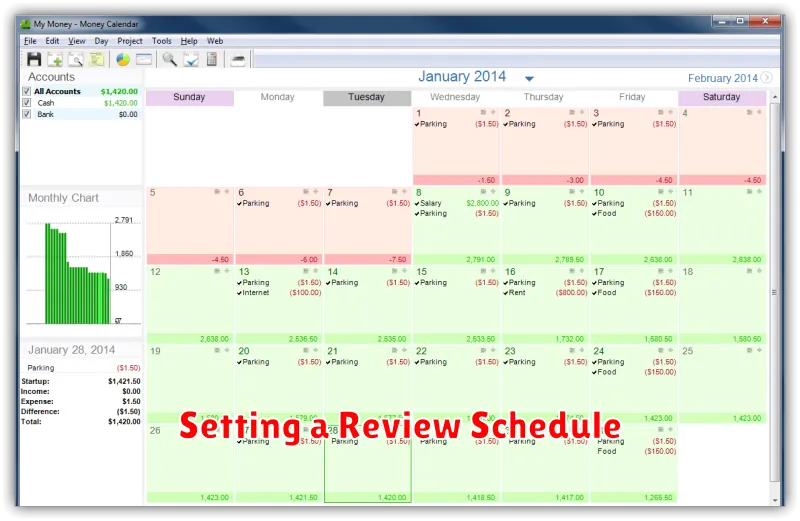Life is constantly changing, and your financial plan should be no different. Whether you’re getting a promotion, starting a family, or retiring, your financial needs and goals will evolve over time. This is why it’s crucial to review and adjust your financial plan regularly. By taking the time to reassess your situation, you can ensure that your plan is still on track to help you achieve your financial goals.
A regular review of your financial plan can help you identify areas where you can improve, such as finding ways to save more money, investing strategically, or reducing debt. It can also help you stay on top of any changes in your financial circumstances, such as a change in income or expenses. In this article, we’ll explore the importance of reviewing and adjusting your financial plan regularly, and we’ll provide some tips on how to make the process easy and effective.
Why Review Your Financial Plan?
A financial plan is a roadmap to your financial future. It outlines your goals, strategies, and timelines for achieving them. However, life is unpredictable, and your circumstances can change over time. That’s why it’s crucial to review your financial plan regularly. Here are just a few reasons why:
Changes in Your Financial Situation: Your income, expenses, and assets can fluctuate throughout your life. A promotion, a job loss, a marriage, a birth, or a change in housing can all significantly impact your financial plan. Regularly reviewing your plan helps you adjust it to reflect these changes and stay on track towards your goals.
Market Fluctuations: The stock market and other investments are constantly in flux. A review allows you to evaluate the performance of your investments and make necessary adjustments based on current market conditions. You may need to rebalance your portfolio or adjust your risk tolerance.
Changes in Your Goals: Your financial goals may also change as you progress through life. You might decide to buy a house sooner, retire earlier, or pursue a new education. Reviewing your plan enables you to adapt it to accommodate these evolving goals and make sure your strategies are aligned.
New Opportunities: Sometimes, life throws you unexpected opportunities, like a chance to invest in a new business or a windfall inheritance. Reviewing your plan allows you to incorporate these opportunities and leverage them to your advantage.
By reviewing your financial plan regularly, you can ensure it remains relevant to your current situation, goals, and aspirations. It’s not a set-it-and-forget-it document. Rather, it’s a living, breathing tool that should be updated as your life unfolds.
Life Events That Trigger a Review
Life is full of changes, and these changes can significantly impact your financial plan. It is crucial to review and adjust your plan regularly to ensure it remains relevant and effective in achieving your financial goals. Here are some life events that typically warrant a review of your financial plan:
Major Life Events
- Marriage or Divorce: These events drastically alter your financial situation, requiring you to assess shared assets, liabilities, and future financial goals.
- Birth of a Child: The arrival of a child brings new expenses and requires you to reassess your savings, insurance coverage, and future college planning.
- Death of a Spouse or Family Member: This can necessitate updates to wills, trusts, and beneficiary designations, as well as an overall review of your financial plan to adjust for potential changes in income and expenses.
- Job Change or Loss: A change in employment status, including a promotion, demotion, or job loss, can impact your income and savings goals, requiring a reassessment of your financial plan.
- Retirement: This marks a significant shift in your financial landscape. Your financial plan needs to be adjusted to ensure sufficient income for retirement expenses, healthcare, and other needs.
Significant Financial Events
- Inheritances or Gifts: Receiving substantial funds requires careful consideration of how to manage and invest this new wealth to maximize its potential.
- Major Purchases: Significant expenditures, such as purchasing a home, car, or investing in a business, necessitate a review of your debt levels, savings, and cash flow to ensure affordability.
- Changes in Interest Rates: Fluctuations in interest rates can affect your savings, investments, and debt payments, necessitating adjustments to your financial plan.
- Changes in Tax Laws: Tax laws are subject to change, potentially impacting your investment strategies, retirement savings, and overall tax burden. Regularly reviewing and adjusting your financial plan can help you navigate these changes.
These are just some of the key life events that should prompt a thorough review of your financial plan. Regularly evaluating your financial goals, strategies, and resources ensures your plan stays aligned with your evolving needs and helps you achieve financial success in the long term.
Assessing Your Financial Goals
Once you’ve reviewed your current financial situation, it’s time to assess your financial goals. Ask yourself these questions:
- Have your goals changed since you first set your financial plan?
- Are your goals still realistic and attainable?
- Do you need to adjust your timeline for achieving your goals?
- Are there any new goals you want to add to your plan?
For example, if you’re planning for retirement, you might need to adjust your goals if you decide to retire earlier or later than originally planned. Or, if you’re saving for a down payment on a house, you might need to adjust your goals if interest rates increase or if you decide to buy a more expensive home.
Being honest about your financial goals and whether they are still relevant is essential for keeping your financial plan on track. If your goals have changed, you’ll need to adjust your plan accordingly.
Analyzing Your Income and Expenses
Regularly reviewing and adjusting your financial plan is crucial for achieving your financial goals. A key part of this process involves analyzing your income and expenses. This step allows you to gain a clear understanding of your financial situation and identify areas where adjustments can be made to improve your financial health.
Start by tracking your income. This includes all sources of income, such as salary, wages, investments, and side hustles. Once you have a comprehensive list of your income streams, move on to tracking your expenses. This involves categorizing your spending, such as housing, food, transportation, entertainment, and debt payments.
There are various methods for tracking your income and expenses. You can use spreadsheets, budgeting apps, or even a simple notebook. The important thing is to choose a method that works best for you and stick to it consistently. By tracking your income and expenses, you can easily identify areas where you might be overspending or underutilizing your resources. This information can help you make informed decisions about how to allocate your money effectively.
Once you have a clear understanding of your income and expenses, you can start to analyze your spending patterns. Look for areas where you can potentially reduce expenses or increase income. This analysis will help you identify opportunities to improve your financial well-being. Perhaps you can negotiate lower interest rates on your loans, switch to a more budget-friendly phone plan, or explore ways to generate additional income through side hustles.
Analyzing your income and expenses is a continuous process. Life is constantly changing, and your financial needs and priorities will evolve as well. By regularly reviewing and adjusting your financial plan, you can ensure that your finances are aligned with your goals and that you are making progress towards a secure and prosperous future.
Reviewing Your Investment Portfolio

Your investment portfolio is a reflection of your financial goals and risk tolerance. As your life changes, so too should your investment strategy. Regularly reviewing your portfolio ensures that it’s still aligned with your goals and that you’re not taking on unnecessary risk.
There are several key aspects of your investment portfolio to review:
- Asset Allocation: This refers to the mix of different asset classes in your portfolio, such as stocks, bonds, and real estate. Your asset allocation should be tailored to your investment goals and risk tolerance. As you age, you may want to shift towards a more conservative asset allocation by reducing your exposure to stocks and increasing your exposure to bonds.
- Performance: How have your investments performed over time? Are they meeting your expectations? Consider both the absolute return and the risk-adjusted return. If certain investments are underperforming, you may want to consider selling them and investing in something else.
- Fees and Expenses: High fees and expenses can eat into your returns over time. Make sure you understand the fees associated with your investments and compare them to similar products. Consider switching to lower-cost options if necessary.
- Tax Implications: Tax efficiency is an important consideration for your investment portfolio. Make sure you understand the tax implications of your investments and consider strategies for minimizing your tax burden.
Reviewing your investment portfolio doesn’t have to be a complex process. You can use online tools or consult with a financial advisor. The important thing is to make sure you’re regularly reviewing your portfolio and making adjustments as needed to ensure it’s aligned with your financial goals.
Adjusting Your Risk Tolerance
Your risk tolerance is a critical factor in your financial plan. It dictates how much risk you’re willing to take with your investments. Your risk tolerance can change over time due to factors like age, income, life stage, and personal circumstances. Regularly reviewing your risk tolerance is vital to ensure your investment strategy aligns with your current goals and comfort level.
If your risk tolerance has shifted, you might need to adjust your portfolio. For example, if you’re approaching retirement and want to reduce risk, you may choose to invest in more conservative assets like bonds. Conversely, if you’re young and have a long investment horizon, you might be comfortable with a portfolio heavily weighted towards stocks, which tend to offer higher growth potential but also carry higher risk.
Here are some factors that can influence your risk tolerance:
- Age: Younger investors generally have more time to recover from market fluctuations, allowing them to take on more risk. As you get closer to retirement, you may want to lower your risk tolerance.
- Financial Situation: Your income, debt levels, and savings all contribute to your risk tolerance. A stable income and low debt allow you to take on more risk.
- Life Stage: Your life stage, such as having young children or being a single parent, can impact your risk tolerance. You may need a more conservative approach when responsibilities are high.
- Investment Goals: Short-term goals, such as buying a house, typically require a more conservative approach than long-term goals, such as retirement.
- Personal Circumstances: Events like a job loss, illness, or family changes can affect your risk tolerance. These events may require you to reassess your portfolio.
Regularly reviewing your risk tolerance and adjusting your portfolio accordingly ensures that your investments continue to work for you. This proactive approach helps you navigate market volatility and achieve your financial goals over time.
Evaluating Your Insurance Coverage

As part of your regular financial review, it’s crucial to assess your insurance coverage. Insurance provides a safety net, protecting you from significant financial losses due to unforeseen events. But, your needs change over time, so your existing policies might no longer be adequate.
Here are some key areas to focus on when evaluating your insurance coverage:
- Health Insurance: Are your current health insurance plans still meeting your needs? Have your medical expenses changed? Consider if you require higher deductibles or co-pays, or if a different plan with better coverage is a better fit for your current situation.
- Life Insurance: Has your family structure changed? Are your current life insurance policies sufficient to cover your loved ones’ financial needs in case of your passing? This is especially important if you’ve had a new child, taken on a mortgage, or have additional financial obligations.
- Home and Auto Insurance: Have you made significant changes to your home or vehicle, like renovations or upgrades? Your insurance premiums and coverage levels may need adjusting to reflect these changes. Also, make sure your deductible aligns with your risk tolerance and financial situation.
- Disability Insurance: This type of insurance protects your income if you become unable to work due to an illness or injury. As your income and responsibilities change, re-evaluating your disability insurance needs is important to ensure it provides sufficient financial protection.
- Other Insurance: Review any other insurance policies you may have, like renter’s insurance, umbrella insurance, or long-term care insurance. Ensure these policies still meet your needs and are adequately protecting you from potential risks.
When evaluating your insurance coverage, it’s beneficial to:
- Shop around for better rates: Don’t be afraid to compare rates and coverage from different insurance providers. You may find more affordable options with similar or even better coverage.
- Consult with a financial advisor: A financial advisor can offer personalized advice on insurance needs based on your unique financial situation. They can help you determine the right amount and types of insurance coverage for your needs.
By regularly reviewing and adjusting your insurance coverage, you ensure you have the right level of protection in place. This helps mitigate financial risks and provides you with peace of mind, knowing you and your loved ones are financially secure in the face of unexpected events.
Updating Your Retirement Plan
Your retirement plan is a living document, not a set-it-and-forget-it plan. As your life changes, your financial goals and needs will also change. You may have a new job, a new family, or a new understanding of what you need for a comfortable retirement. It is important to review and adjust your retirement plan regularly to make sure it’s still on track to meet your goals.
Here are a few key factors that may require you to update your retirement plan:
- Changes in income: A promotion, job change, or unexpected income loss will all affect your retirement savings.
- Changes in expenses: A new mortgage, medical bills, or the cost of college can impact your retirement planning.
- Changes in your financial goals: Perhaps you’re now planning to retire earlier or later than you originally thought. Your goals can change, and your plan needs to be flexible to accommodate these changes.
- Changes in your risk tolerance: As you get closer to retirement, your risk tolerance may change. You may want to shift your investments to more conservative options.
By periodically reviewing your retirement plan and making necessary adjustments, you can ensure that you’re on track to achieve your financial goals. This will help you to retire with confidence and enjoy the lifestyle you desire.
Considering Tax Implications
Your financial plan should be a living document that adapts to changes in your life and the economy. One critical aspect that often requires adjustments is tax implications. Tax laws are constantly evolving, and your financial decisions can have a significant impact on your tax liability. A regular review helps you identify potential tax savings opportunities or strategies to minimize your tax burden.
For example, if you’ve received a large sum of money or experienced a major life event, you might need to adjust your investment portfolio, retirement planning, or estate planning. These changes can directly affect your tax situation. A financial advisor can help you understand how these changes impact your tax liability and recommend strategies to optimize your tax efficiency.
Moreover, taking advantage of tax-advantaged accounts like 401(k)s, IRAs, or Health Savings Accounts can significantly reduce your tax bill in the long run. A regular review can help you ensure you’re maximizing your contributions and using these accounts strategically.
By considering tax implications regularly, you can make informed financial decisions that are both financially sound and tax-efficient. It allows you to navigate the complexities of tax laws and proactively manage your tax liability, potentially saving you significant amounts of money over time.
Seeking Professional Guidance for Adjustments
As your life evolves, so too should your financial plan. While you can certainly make some adjustments on your own, seeking professional guidance is highly recommended. A qualified financial advisor can provide a fresh perspective and help you navigate complex situations. They can analyze your current plan, identify potential gaps, and recommend tailored solutions that align with your goals and risk tolerance.
Here are some key reasons why seeking professional guidance is crucial:
- Objective Expertise: Financial advisors offer an objective view of your finances, free from emotional biases that can cloud your judgment.
- Market Knowledge: They stay abreast of market trends and economic conditions, ensuring your plan is aligned with current realities.
- Tax Optimization: Advisors can help you navigate tax laws and minimize your tax burden through strategic planning.
- Personalized Strategies: They tailor investment strategies and financial solutions to your unique circumstances and goals.
- Accountability and Support: Having a professional by your side provides accountability and support as you work towards your financial objectives.
Remember, a well-structured financial plan is a dynamic document that needs regular review and adjustment. Engaging a professional can make this process seamless and ensure your plan remains effective in achieving your long-term financial aspirations.
Setting a Review Schedule

Regularly reviewing and adjusting your financial plan is crucial for achieving your financial goals. But how often should you do this? A good rule of thumb is to review your plan at least annually, and more frequently if there are major life changes.
Here are some events that might warrant a more frequent review:
- Job change or promotion
- Marriage or divorce
- Birth or adoption of a child
- Significant changes in income or expenses
- Significant changes in interest rates or the stock market
When setting your review schedule, consider your individual circumstances and the complexity of your financial plan. You may find it helpful to use a calendar or reminder system to track your review dates.
Benefits of Regular Financial Plan Reviews
Regularly reviewing and adjusting your financial plan is essential for maintaining financial stability and achieving your financial goals. It’s not just about looking at your numbers; it’s about ensuring your plan aligns with your current circumstances, aspirations, and market conditions. Here are some key benefits of regular financial plan reviews:
Stay on Track: Life is dynamic, and your financial goals and priorities may change over time. A review allows you to assess progress toward your objectives, identify potential roadblocks, and make necessary adjustments to stay on track. This proactive approach prevents you from falling behind or missing out on opportunities.
Adapt to Changing Circumstances: Job changes, unexpected expenses, market fluctuations, and even changes in family dynamics can impact your financial plan. Regular reviews help you identify these shifts and modify your plan accordingly. This ensures your plan remains relevant and effective in addressing your evolving needs.
Optimize Investment Strategies: Markets are constantly in motion. Periodic reviews allow you to re-evaluate your investment portfolio, adjust your asset allocation, and consider opportunities to potentially enhance returns. By staying informed and making timely adjustments, you can capitalize on favorable market conditions and mitigate potential risks.
Identify and Minimize Risks: Financial risks can evolve over time. Regular reviews provide an opportunity to identify potential vulnerabilities and implement strategies to mitigate them. This proactive approach helps safeguard your financial well-being and protect your hard-earned savings.
Gain Clarity and Confidence: A comprehensive financial plan review fosters a clear understanding of your financial situation, strengths, and areas for improvement. This process can provide peace of mind and boost your confidence in your ability to achieve your financial goals.

